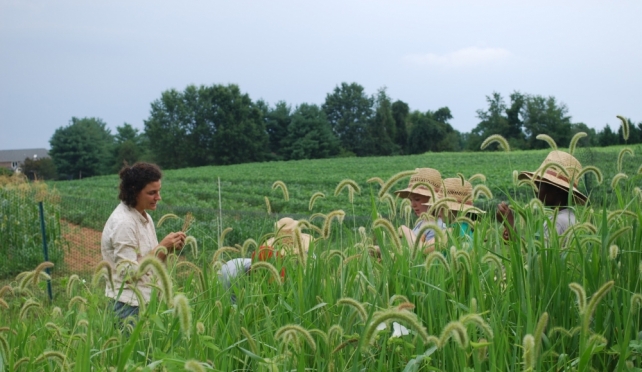By Sophia Maravell
I recently started my student practicum at Great Kids Farm as part of a Masters in Education degree. I shadowed farmer Greg Strella, volunteered with the Healthy Eating Healthy Living program, and worked with the high school Work Based Learning interns. It has been an inspiring learning experience for me.
Based on my experiences as a farm-based educator at Brickyard Educational Farm, Great Kids Farm is a replicable model that could serve public, private, or home schools in urban, suburban, or rural school systems. I hope my own county, Montgomery County, will be able to enact a similar model on the 20-acre organic farm on Brickyard Road, owned by the county school system.
While most other educational farms rely completely on grants and private sector donations, Great Kids Farm is majority funded by the Baltimore City Public School System. This guarantees Great Kids Farm sustainability, and allows the farm to focus their time and energy on honing and improving their programming as opposed to grant writing and fundraising, while Friends of Great Kids Farm raises supplemental funds. This is a revolutionary and rare approach to financial stability. It is wonderful that Baltimore City Public School System sees the value in the work Great Kids Farm is doing.
Having Great Kids Farm integrated into the school system comes with many advantages. The on-farm educators are valued and employed like teachers. Produce from the farm is sold to the school cafeterias, and high school students have the opportunity to work at the farm in the paid Work Based Learning Program. Great Kids Farm can, and should, be a replicable model for the rest of the country for how to integrate food literacy, environmental, outdoor, experiential, vocational, and farm-based education into our public schools.
The benefits of farm-based education are many. They include increased academic achievement and focus in other academic areas, catering to different learning styles and the multiple intelligences, improving healthy eating habits in children (1) and fostering an environmental ethic (2). Farm-based education aligns well with the Common Core, Next Generation Science Standards, the Maryland Environmental Literacy Standards, and Science, Technology, Engineering, and Math (STEM) curricula.
Food and farm literacy is crucial for the health of our current and future generations in both urban and rural areas. With more and more states passing environmental literacy requirements, and with the passing of the Healthy Hunger-Free Kids act, the country is ripe for effective, creative, healthy, environmentally and socially responsible solutions such as Great Kids Farm.
- "Benefits of Farm to School." Farm to School Network. N.p.. Web. 22 Jan 2014. <http://www.farmtoschool.org/files/publications_514.pdf>.
- Education Development Center. (2000). Schoolyard Learning: The Impact of Schoolgrounds. Newton, MA: Education Development Center and the Boston Schoolyard Funders Collaborative.


